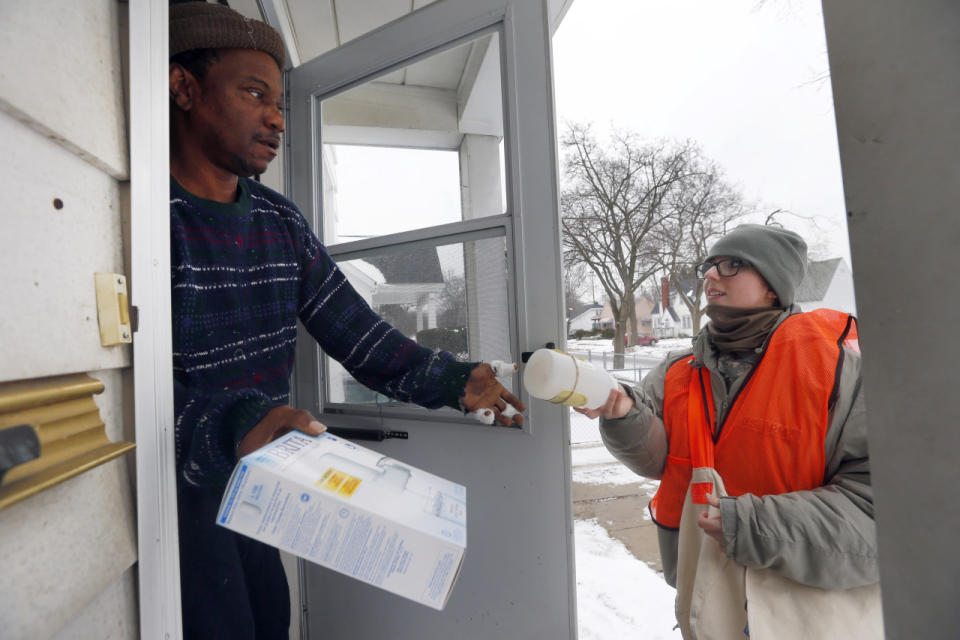Future fund for Flint victims complicated, unlikely, says legal expert
Congressional Democrats from Michigan, led by Sens. Debbie Stabenow and Gary Peters, are calling on the state’s Republican governor, Rick Snyder, to establish a “future fund” to deal with the future medical expenses of Flint residents who were exposed to dangerous levels of lead in the city’s water.
But the creation of such a fund would be complicated and raise more questions than it might answer, according to victim compensation specialist Kenneth Feinberg, who has overseen victim funds for 9/11, the BP oil spill and the General Motors ignition-switch failures.
In an interview with Yahoo News, Feinberg suggested that given the federal government’s role in reimbursing states for medical care generally, it might be impossible to force Michigan to pick up the entire bill for those future health care costs, no matter how big a role the state played in creating the disaster. And based on the limited precedents for such a fund, Flint residents who accepted compensation from it might be required to waive their rights to pursue litigation in the future.
“I’m raising question[s] that might never see the light of day because there will never be a fund,” Feinberg said. “But if there is a fund to reimburse medical expenses, are there any preconditions, [i.e.] ‘I will not sue’?”

Flint, Mich., is currently under a state of federal emergency because of dangerous contamination of the city’s water supply, which is expected to cause long-term medical problems for its citizens. (Photo: Brett Carlsen/Getty Images)
The intent of the Democrats in seeking such a fund was to put some of the financial — and moral — burden on the Republican-led state government for decisions that led to the poisoning of the city’s water supply. It was a response to Snyder’s request that the federal government declare a federal emergency in Flint, allowing the Obama administration to begin sending money to the beleaguered city. In exchange for supporting Snyder’s request, Stabenow, Peters and Flint’s representative in the U.S. House, Democrat Dan Kildee, asked for a financial commitment from the state as well.
“Whether through surplus funds, rainy day funds or other state resources, the state has a moral obligation to make Flint whole and fix the damage that has been done,” the Jan. 15 letter from the Democrats to Snyder read. “In addition to addressing the immediate needs of the community, we ask that state resources be set aside in a ‘Future Fund’ to address the long term damage, including the health and educational needs of the children exposed to high lead levels.”
Yahoo News explored the idea of a “future fund” for Flint with Feinberg, a Washington-based attorney who is arguably the nation’s leading expert on the issue. Below is his interview, lightly edited for clarity.
Yahoo News: It seems like the current demand for a future fund from members of Congress was an initial political reaction to a horrible situation and that the idea has not yet been fully vetted in terms of practicality. What is the precedent for this sort of effort?
Kenneth Feinberg: Let’s look at this in two ways: First, there is precedent for the idea of creating a fund to provide financial relief to Flint citizens. Congress just passed the Zadroga reauthorization saying that there will be taxpayer money available — federal money — to compensate first responders who went to the World Trade Center after the 9/11 attacks and now suffer from various maladies allegedly caused by breathing that guck. … The idea that federal funds may be available to compensate for health effects, I can see a fund being created in Flint to periodically test young people, children, others, who might be at risk as a result of drinking water that is harmful. There are precedents. Not so much for sending a specific check to an individual, but rather we will provide you in-kind medical help monitoring, periodic examinations and testing going forward to try and determine whether and to what extent you’ve been harmed by lead in the drinking water.

A Flint resident receives water filters and testing kits from a Michigan National Guard specialist. Democrats are hoping the state’s governor will announce plans to fund future relief efforts. (AP Photo/Paul Sancya)
Of course, that wasn’t without difficulties at the congressional level. It’s tough to imagine what would happen at a state level.
Oh, it was difficult, but meanwhile it was eventually reauthorized, not without difficulties, but the politics of the doable. They got it passed.
There’s three issues. That’s the first issue — there is precedent for compensating victims for health-related costs. The second issue is, should it be federal or state?
Now, I’m not sure at the end of the day … whether it makes a difference if it’s federal or state. The first and most important thing is that somebody ought to be paying to help the residents. … [But] if it’s state money, where is the money coming from? To what extent are health-related costs paid for by the federal government in any event? Is this Medicare money? Is it Medicaid money? Is it appropriated money from the state that’s reimbursable under federal law for health-related injuries?
Just because money is initially appropriated by the state — as a sign of culpability, let’s say — that doesn’t mean the state can’t seek reimbursement from the federal government for health-related costs.
This gets very complicated. Especially if some of these Flint residents, for example, are getting health benefits under Medicaid. The state may put up the money initially, but now is Congress going to pass a law saying that these funds in Michigan shall not be reimbursed?
And then the third issue is — are any rights of Flint citizens surrendered by taking this money?
With a lot of these funds, the ones you’ve worked with, the people covered by them have to waive their legal rights in order to accept support.
I don’t think anybody’s focused on that yet. If you accept funds from the state or federal government, is it a gift? Or do you have to sign a waiver, “I will not sue”? In the 9/11 fund, in Zadroga, my understanding is that if you take money from Zadroga for health-related costs, you surrender your right to litigate. For Flint, has anybody thought this through? There may be some very enterprising trial lawyers who are right now fashioning some sort of litigation, class action, brought against somebody, the state of Michigan or the local city manager or whoever … a private lawsuit seeking damages for intentional tort in putting these kids at risk. Is such litigation contemplated? And if you do enact legislation, Gov. Snyder or Congress, will there be a condition, “If you take this money, if you accept this offer for medical assistance, you first have to surrender your private right to litigate.”
In GM if you accepted money from my fund, in 9/11 if you accepted money from my fund, in BP if you accepted money from my fund, you surrendered your right to sue. But, you see, those examples — GM, 9/11, BP — those were checks going to individuals, money actually being given to individuals in lieu of litigation. That’s not what’s contemplated here, as far as I can tell. What’s contemplated here, like 9/11 Zadroga, is medical assistance. You’re not getting a check. We’ll pay the medical provider for giving you some lead testing. … The Zadroga first responders, I think most of them already waived their right to sue way back when in the 9/11 fund, so I’m not sure that it’s a precedent, but I’m just raising the question.
Is there anything else lawmakers should consider when thinking about whether a future fund should work? Or what readers should know?
It might be politically very advantageous to argue that it ought to be the state that creates the fund. [But] right now, for example, states pay Medicaid to poor people. … It’s all reimbursable from the federal government, or 90 percent is. So let’s say that Stabenow gets up and says, “We want Snyder’s state government to pay.” Well, Snyder might say, “All right, we’ll front the money, but we will oppose any congressional law to prevent reimbursement.” So I’m not sure anybody’s really thought that through yet.
Here’s the other thing: The governor may decide, you know, let’s be realistic here. Let’s give them whatever they want in Flint. Let’s just open up the checkbook and give them whatever they want, but in return, they cannot sue. You see, he may conclude — or the state government may conclude — it’s cheaper under these facts to give them medical care and avoid extended, protracted, very expensive lawsuits. Maybe that’s a good tradeoff.

Feinberg, pictured here, has been tasked to lead some of the nation’s largest and most complicated victim compensation efforts. (AP Photo/Dave Martin, File)

